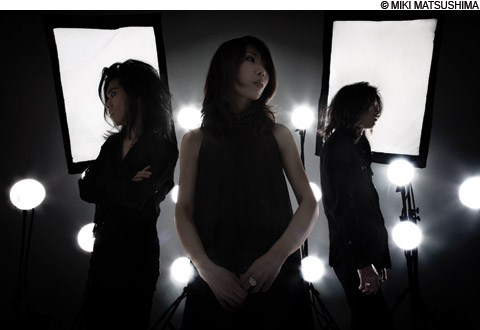
ANYTHING GOES Ambient, avant-garde, doom, drone, experimental, heavy, industrial, metal, minimalist, noise, psychedelic, punk, rock, sludge, stoner — versatility is Boris’s calling card. |
Double releases, double-necked guitars, double mirrors, and double rainbows. When it comes to interviewing the unclassifiable Japanese group Boris, nothing can be single-minded. Add to this joy that of being able to communicate with drummer/backing vocalist Atsuo only through a translator. Double the fun!It takes more adjectives than a Halloween-themed Mad Lib to classify Boris. Call them ambient, avant-garde, doom, drone, experimental, heavy, industrial, metal, minimalist, noise, psychedelic, punk, rock, sludge, and stoner. In one sense, it's sheer versatility that has allowed Boris to be so prolific. The trio have created more than 20 albums since their inception 15 years ago, many of which are improvised recordings released in small runs. Others are full-length albums of conventional songs, such as Attention Please and Heavy Rocks, two new Boris albums issued in tandem by Sargent House earlier this year.
In another sense, the perceived nebulous nature of the trio (which also includes Wata on guitar/vocals and Takeshi on double-neck bass guitar/vocals) correlates to the "exoticness" that many Americans associate with Japan. "We understand when Japanese culture comes to America people are going to get confused," says Atsuo. "We don't care what people label us. It's part of the fun. At the end of this chaos there is something good."
The exoticism is a two-way street. Atsuo marvels at the immediacy and lack of design that goes into something like the viral Auto-Tune "Double Rainbow" YouTube video. Although that might not be what most Americans would hope for when we think about the best of our exports, one man's trash is another man's, well, double rainbow.
With a heavy recording and touring regimen that has kept them out of their native Japan for much of their career, Boris's popularity abroad has been building slowly over the last 10 years. In Japan, Boris feel pretty much ignored. "There is not much media coverage for this type of band so people don't really know what's going on," Atsuo says. "Yes, we are in a bubble, but this bubble is like a two-way mirror — we can see the outside but they can't see us."
Recently, Akuma No Uta (2003) cracked Pitchfork's top 200 albums of the 2000s, and many more albums and side projects (including several collaborations with Japanese noise-artist Merzbow, who according to Atsuo "made us realize the sound or music is a tone or a note before it becomes a composition") filled the gap leading up to 2008's more vocally oriented Smile. Then, something strange happened: Boris stopped releasing albums.
With sessions for a Smile follow-up well underway, Boris decided to scrap the record and move in a different, heavier direction. Meanwhile, Wata was developing the music for her first solo album. Boris then decided to absorb Wata's solo project into a proper Boris album (this became Attention Please, the first Boris album sung completely by Wata), while focusing their newest, heavier material on Heavy Rocks. Because Boris believed that each album represented a different side of their sound, they decided to put them both out at once.